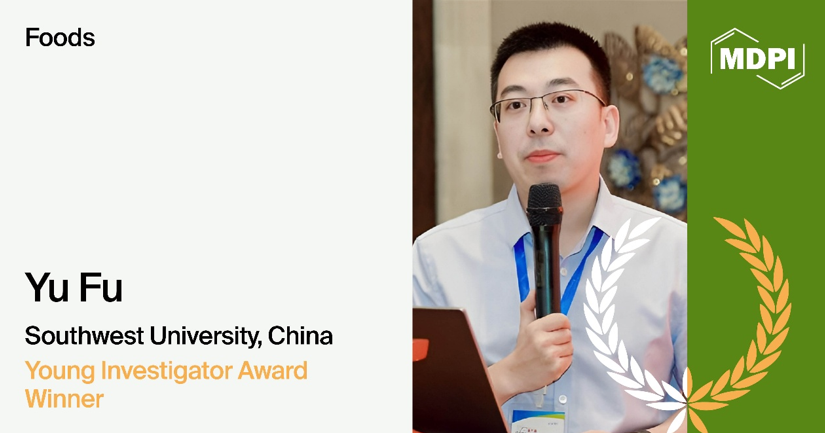
Interview with Prof. Fu Yu—Winner of the Foods Young Investigator Award
The journal Foods (ISSN: 2304-8158) is delighted to present the winner of the 2025 Young Investigator Award — Prof. Fu Yu.
Prof. Fu Yu works at the College of Food Science, Southwest University (Chongqing, China), where his research focuses on bioactive peptides, collagen chemistry, peptide-based functional food ingredients and the valorization of food by-products.
His recent work includes investigations into the preparation and mechanism of food-derived peptides for health and flavor, such as the role of γ-glutamyl peptides in taste enhancement and functional activity.
In addition, Prof. Fu has explored the application of bio-preservatives in meat preservation, signaling his interest in the sustainable utilization of protein-rich residues and the development of novel functional foods.
We are pleased to hear from Prof. Fu about his research journey, motivations, and vision for the future of food science.
1. Could you briefly introduce yourself and share your current research focus?
I am currently a Professor at College of Food Science, Southwest University. I received my PhD degree in food science from Aarhus University, Denmark. Thereafter, I worked as a postdoctoral fellow at University of Aberdeen and University of Copenhagen. I also had the opportunity to be a visiting scholar at the University of Manitoba, Canada. My current research interests mainly focus on the structure–function relationship of food protein/peptides and their structural modification to assign specific characteristics such as functionality, flavor and bioactivity.
2. What inspired you to pursue research in the field of food science?
I was inspired by the urgent need to address sustainability challenges within food systems, and I am motivated to pursue a career where I can help transform the industry through scientific innovation.
3. How does it feel to be recognized with the Foods Young Investigator Award?
I was truly honored and excited to receive the Foods Young Investigator Award. It is a meaningful recognition of my research efforts and accomplishments in the field of food science.
4. Can you tell us about the research that led to this recognition and its potential impact?
My research aims to address global challenges related to food sustainability and health. One notable contribution of my work focuses on upcycling fish processing by-products into high-value collagen peptides. Our breakthrough was developing a method to prepare collagen glycopeptides via enzymatic glycosylation approach. The most significant finding was that these glycopeptides showed salt taste-enhancing activity and can reduce sodium usage content by up to 30% in food products, which contributes to salt reduction without compromising taste.
5. What challenges have you encountered in your work, and how did you overcome them?
Scientific research often requires collaboration, especially when tackling cutting-edge questions that are difficult to address alone. I have been fortunate to work with dedicated collaborators around the world, and we have been able to overcome these challenges through teamwork and shared expertise.
6. What trends or developments in food science do you find most exciting right now?
I am particularly excited about the application of artificial intelligence in the field of food science.
7. What advice would you give to young researchers starting their careers in this field?
My advice is to focus on research questions that not only address scientific challenges but also have practical applications in the industry.
8. Looking ahead, what are your main goals or projects for the coming years?
One of my main goals is to advance the industrialization of my research outcomes, contributing to the food industry with sustainable technologies.
